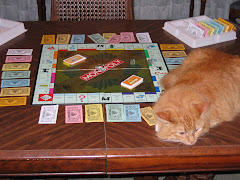Once a poor widow, well along the road
To old age, in a little house abode
Beside a forest, standing in a dale.
This widow, of whom I tell you now my tale,
Even since the day when she was last a wife
All patiently had led a simple life;
Small were her earnings and her property,
But what God sent she used with husbandry,
And kept two daughters and herself. Of sows
Three and no more she had about the house,
Also a sheep called Molly, and three kine.
Her sooty hall and bower were nothing fine,
And there full many a slender meal she ate.
No poignant sauce was needed for her plate;
No dainty morsel passed her throat; her fare
Accorded with the clothes she had to wear...
She had a yard, by stakes well fenced about,
And by a dry ditch girt, that ran without,
And there she kept a cock named Chanticleer;
None in the land at crowing was his peer.
His voice was merrier than the organ's tone
That loud on mass-days in the church is blown,
And surer from his lodge his crowing fell
Than stroke of any clock or abbey bell.
He knew by nature each ascension of
The equinoctial circle arched above,
For when fifteen degrees had been ascended,
He crowed, so that it could not be amended.
His comb was coral-red, and high withal,
And cut in notches, like a castle wall;
Like jet his black bill glittered in the sun,
His legs and toes were azure every one,
No lily-flower could match his nails for white,
And gold was all his body, burnished bright.
This noble cock had under goverance
Seven hens, to do all wholly his pleasance;
Which were his paramours and sisters dear
And in their colors matched him wondrous near;
Of whom she that was fairest-hued of throat
Fairly was called Damoselle Pertelote.
Courteous she was, discreet and debonaire,
Companionable, and bore herself so fair
Even since the day that she was seven nights old,
She hath the heart of Chanticleer in hold--
Locked in each motion, in each graceful limb;
He loved her so, that this was well with him.
But what a joy it was to hear them sing
In sweet accord: "My Love's Gone Journeying"
While the bright sun uprose from out the land,
For this was in the time, I understand,
When all the birds and beasts could sing and speak...
~ from The Nuns' Priest's Tale
Of Chanticleer and Pertelote,
The Cock and the Hen;
The Canterbury Tales by Geoffrey Chaucer
Friday, June 7, 2013
Thursday, June 6, 2013
The Monk's Tale [Julius Caesar]
By wisdom, manhood, and high work in war,
From humble bed to royal majesty
Julius uprose, the mighty conqueror,
That won the Occident by land and sea
With force, or treaties fashioned skillfully,
And thus to Rome made it all tributary;
And later, emperor of Rome was he
Till fortune turned at length his adversary.
O mighty Caesar, that in Thessaly
Against thy father-in-law, great Pompey, drew,
Who brought from all the east the chivalry
As far as where the day dawns in the blue--
Thou through thy knighthood took them all, or slew,
Save for a remnant that with Pompey fled,
Thus didst thou awe the Orient, and subdue;
Thank Fortune, that so prospered thee and sped!
But now a little while will I lament
Pompey, of Rome the noble governor
That forth in flight after this battle went;
One of his men, a false conspirator,
Smote off his head, and this to Julius bore,
Hoping to win great favor as his friend.
Pompey, alas! the Orient's conqueror,
That Fortune brought thee thus to such an end!
To Rome again went marching Julius,
Laurelled, and riding in a triumph high,
But on a time one Brutus Cassius,
That saw his high estate with jealous eye,
Formed a conspiracy full dark and sly
Against this Julius, in a subtle way,
And fixed the very place where he should die,
Struck down by daggers, as I soon shall say.
Unto the capitol this Julius passed
One day, for there by habit would he go,
And in the capitol they seized him fast,
This Brutus false, and many another foe,
And with their daggers many a grievous blow
They dealt him, and they left him where he fell,
And only once or twice he groaned for woe,
If it is not a lie the legends tell.
So manly was the heart this Julius bore,
And so he loved a noble modesty,
That, though his deadly gashes hurt him sore,
Across his thighs his mantle quietly
He cast, that none his nakedness should see;
For in his dying swoon as he reclined,
And knew his death a certain thing to be,
The thought of modesty was in his mind.
Lucan, to thee this story I commend,
And to Valerian and Suetonius,
That set it down, its substance and its end:
How Fortune with these conquerors did thus
Begin as friend, and then was traitorous.
Let none put trust upon her favor long,
But watch her always. For so teacheth us
The fate of all these conquerors so strong!
~ from The Monk's Tale;
The Canterbury Tales by Geoffrey Chaucer
From humble bed to royal majesty
Julius uprose, the mighty conqueror,
That won the Occident by land and sea
With force, or treaties fashioned skillfully,
And thus to Rome made it all tributary;
And later, emperor of Rome was he
Till fortune turned at length his adversary.
O mighty Caesar, that in Thessaly
Against thy father-in-law, great Pompey, drew,
Who brought from all the east the chivalry
As far as where the day dawns in the blue--
Thou through thy knighthood took them all, or slew,
Save for a remnant that with Pompey fled,
Thus didst thou awe the Orient, and subdue;
Thank Fortune, that so prospered thee and sped!
But now a little while will I lament
Pompey, of Rome the noble governor
That forth in flight after this battle went;
One of his men, a false conspirator,
Smote off his head, and this to Julius bore,
Hoping to win great favor as his friend.
Pompey, alas! the Orient's conqueror,
That Fortune brought thee thus to such an end!
To Rome again went marching Julius,
Laurelled, and riding in a triumph high,
But on a time one Brutus Cassius,
That saw his high estate with jealous eye,
Formed a conspiracy full dark and sly
Against this Julius, in a subtle way,
And fixed the very place where he should die,
Struck down by daggers, as I soon shall say.
Unto the capitol this Julius passed
One day, for there by habit would he go,
And in the capitol they seized him fast,
This Brutus false, and many another foe,
And with their daggers many a grievous blow
They dealt him, and they left him where he fell,
And only once or twice he groaned for woe,
If it is not a lie the legends tell.
So manly was the heart this Julius bore,
And so he loved a noble modesty,
That, though his deadly gashes hurt him sore,
Across his thighs his mantle quietly
He cast, that none his nakedness should see;
For in his dying swoon as he reclined,
And knew his death a certain thing to be,
The thought of modesty was in his mind.
Lucan, to thee this story I commend,
And to Valerian and Suetonius,
That set it down, its substance and its end:
How Fortune with these conquerors did thus
Begin as friend, and then was traitorous.
Let none put trust upon her favor long,
But watch her always. For so teacheth us
The fate of all these conquerors so strong!
~ from The Monk's Tale;
The Canterbury Tales by Geoffrey Chaucer
Wednesday, June 5, 2013
The Monk's Tale [Alexander the Great]
No conqueror ever lived that could resemble
Or be compared with him in fame and power;
For all this world with fear of him did tremble;
Of knighthood and of freedom was he flower,
And Fortune gave her honor as his dower.
Save wine and women, nothing could assuage
His lust for arms and toil of battle-hour,
So like a lion did his spirit rage.
How could I praise him then, although I told
Of Darius and a hundred thousand more,
Of kings and dukes, of earls and princes bold
He conquered, and what woe through him they bore?
The world was his, as I have said before,
As far as any man could walk or ride;
To tell or write his knightly strength in war
I could not, though forever more I tried.
~ from the Monk's Tale,
The Canterbury Tales by Geoffrey Chaucer
Or be compared with him in fame and power;
For all this world with fear of him did tremble;
Of knighthood and of freedom was he flower,
And Fortune gave her honor as his dower.
Save wine and women, nothing could assuage
His lust for arms and toil of battle-hour,
So like a lion did his spirit rage.
How could I praise him then, although I told
Of Darius and a hundred thousand more,
Of kings and dukes, of earls and princes bold
He conquered, and what woe through him they bore?
The world was his, as I have said before,
As far as any man could walk or ride;
To tell or write his knightly strength in war
I could not, though forever more I tried.
~ from the Monk's Tale,
The Canterbury Tales by Geoffrey Chaucer
Tuesday, June 4, 2013
The Monk's Tale [Belshazzar]
"This hand was sent from God, that on the wall
Wrote mene, techel, phares, trust ye me.
Thy reign is done, thou hast no weight at all;
Thy realm is now divided, and shall be
Given to the Medes and Persians," ended he.
And it befell the king was slain that night,
And great Darius took the sovereignty,
Though it was his neither by law nor right.
Lordings, here by example ye perceive
How in a lordship is no steadiness;
For Fortune, when she once decides to leave,
Takes from a man wealth, kingdom, and success,
And friends as well, the greater with the less;
For all the friends that Fortune gathers to one,
Turn foes beneath disaster, I should guess;
This proverb is a common and a true one.
~ from The Monk's Tale;
The Canterbury Tales by Geoffrey Chaucer
Wrote mene, techel, phares, trust ye me.
Thy reign is done, thou hast no weight at all;
Thy realm is now divided, and shall be
Given to the Medes and Persians," ended he.
And it befell the king was slain that night,
And great Darius took the sovereignty,
Though it was his neither by law nor right.
Lordings, here by example ye perceive
How in a lordship is no steadiness;
For Fortune, when she once decides to leave,
Takes from a man wealth, kingdom, and success,
And friends as well, the greater with the less;
For all the friends that Fortune gathers to one,
Turn foes beneath disaster, I should guess;
This proverb is a common and a true one.
~ from The Monk's Tale;
The Canterbury Tales by Geoffrey Chaucer
Subscribe to:
Posts (Atom)













